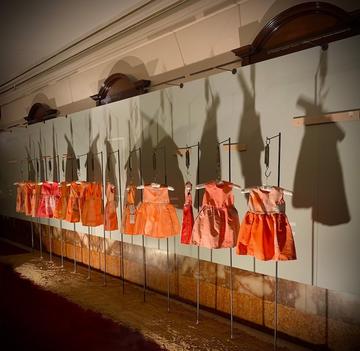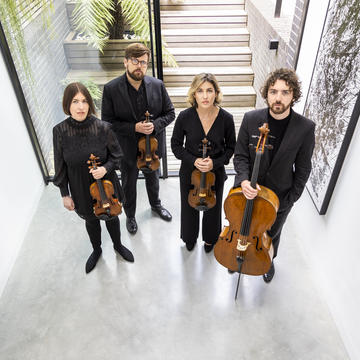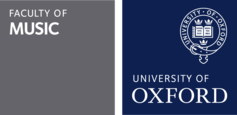Castalian String Quartet

Tickets £15, book via Tickets Oxford. There will be a handful of free tickets available on the door for under 21s and staff and students of the Faculty of Music.
Haydn - String Quartet No.4 in D major, Op.20
Charlotte Bray - Ungrievable Lives (2021)
Beethoven - String Quartet No.13 in Bb major, Op.130, with Grosse Fugue
This concert will feature an accompanying exhibition of Caroline Burraway's installation Ungrievable Lives, the inspiration for Charlotte Bray's first composition for string quartet.
Due to unforeseen circumstances, there has been a programme change, and the quartet will no longer be performing Bartok's String Quartet no. 5. We apologise for any inconvenience caused.
Ungrievable Lives
Oxford University, Faculty of Music present Ungrievable Lives, a collaboration between composer Charlotte Bray and artist Caroline Burraway.
Burraway has been responding to the refugee crisis since 2015, filming and collecting research materials in refugee camps across Europe which she uses for installations, video, and large-scale drawings. This project, supported by UNHCR, aims to provoke a humanitarian response to the twin issues of displacement and dispossession.
Bray, inspired by Burraway’s art installation Ungrievable Lives, comprising 13 children’s dresses, handmade from refugee lifejackets gathered by the artist at the Lifejacket Graveyard in Lesvos, has responded to the migrant crisis with her very first string quartet which has premiered across Europe over the course of 2022/ 23.
Burraway describes her experience of the Lifejacket Graveyard in her own words: "As I stood at the edge of the chasm, it felt like a physical blow - below me mountains of discarded lifejackets, many meters deep, lay quietly abandoned, decaying, buried in the stillness of the surrounding valley. My feet sank into the depths below as I made my way through thousands of loudly shouting colours, each shape evoking the suffocating presence of an abandoned body. Straight away, I knew I needed somehow to bring a sense of this to those who neither would, nor could ever see it, never have the chance to feel it themselves".
Each dress, represents 1 million of the 13 million child refugees worldwide. Today since Ukraine there are a further 2 million. The dresses signify the absent body, evoking memory, absence and loss, and inviting the viewer to meditate and contemplate the story of the refugee's journey and loss as they try to reach the shores of Europe. Dirty, torn, patched together, a mixture of faded oranges, pinks and reds, at first glance they look like any small 3/4 year old dress a young child may wear, your child, my child, any child.... but a closer look slowly confronts the viewer with the realisation of what they're made from and what they embody.
Some dresses bear the name of the country they sailed from stamped across their chest like a fashion slogan, some have motifs of little animals playing happily, their whistles hanging down … The scales, an ancient symbol of justice, signify the weighing of the body and soul, embodying the difficult question: “What is the differential value of a Western life compared to the value of the life of the refugee, arriving at the border of the Western world?”
The pile of sand represents physical, political and cultural borders and - like sands - are forever shifting and changing over time. Man-made boundaries, including linguistic, economic and social, conspire to create further division. Yet the movement of people has been constant throughout history. Migrants, refugees, the displaced and stateless, continue to make up an increasing number of the world population and the symbolic boundaries of identity and culture which make nations, the segmentation between “us” and “them” which is so apparent today will, over time, become redrawn as new forms of cultural diversity are introduced.

Castalian String Quartet
The Castalian String Quartet is taking the international chamber music scene by storm. Gaining renown for interpretations “full of poetry, joy and sorrow, realised to such perfection” (The Observer), they have recently been chosen as our first quartet for the Hans Keller String Quartet Residency.
Formed in 2011, the quartet studied with Oliver Wille at the Hochschule für Musik, Hannover, before being selected by the Young Classical Artists Trust (YCAT) in 2016. They were awarded First Prize at the 2015 Lyon International Chamber Music Competition and in 2018 were recipients of the inaugural Merito String Quartet Award and Valentin Erben Prize, and a prestigious Borletti-Buitoni Trust Fellowship. The ensemble was named Young Artist of the Year at the 2019 Royal Philharmonic Society Awards.
Recent debuts include New York’s Carnegie Hall, the Berlin Philharmonie, Vienna Konzerthaus, Hamburg’s Elbphilharmonie, Paris Philharmonie and the Concertgebouw in Amsterdam. The Castalian String Quartet performs frequently at the Wigmore Hall in its home city of London. In 2018 they recorded Haydn’s Op.76 quartets for the Wigmore Live label and were joined by pianists Stephen Hough and Cédric Tiberghien, violist Isabel Charisius and clarinetist Michaels Collins for a Brahms and Schumann series in the 2019-20 season. Their next Wigmore Hall cycle will feature all three quartets by Benjamin Britten. The quartet often appears at festivals such as Spoleto USA, Aldeburgh, North Norfolk, Cheltenham, East Neuk, Lockenhaus and Heidelberger Frühling. Recent and upcoming premieres include works by Charlotte Bray, Edmund Finnis, Mark Simpson, Simon Rowland-Jones and Sir Mark-Anthony Turnage.
The Castalian String Quartet’s 2022 release Between Two Words (Delphian Records), presenting music by Orlando di Lasso, Thomas Adès, Ludwig van Beethoven and John Dowland, was given a double five-star review as BBC Music Magazine’s ‘Album of the Month’: “this outstanding disc offers listeners a true philosophical journey…a series of intricately connected works, each performed with rare beauty and originality by a quartet at the height of its powers…[the Heiliger Dankgesang from Beethoven Op.132] is nothing short of a revelation in its lucidity of line and sheer beauty of sound.”
The quartet’s name is derived from the Castalian Spring in the ancient city of Delphi. According to Greek mythology, the nymph Castalia transformed herself into a fountain to evade Apollo’s pursuit, thus creating a source of poetic inspiration for all who drink from her waters. Committed to inspiring a diverse audience for classical music, the Castalians have performed everywhere from the great concert halls to maximum security prisons and even the Colombian rainforest.
This concert forms part of the Hans Keller String Quartet Residency at the Oxford University Faculty of Music. The Faculty are grateful for the generosity of The Cosman Keller Art & Music Trust for their donation to the Castalian String Quartet to support this concert.
To find out more about this residency and other performances, please visit our residency page.



